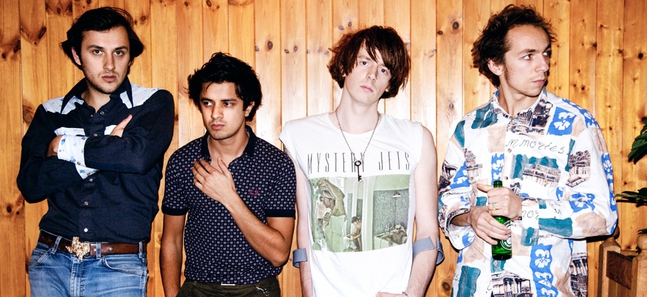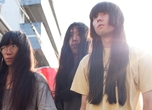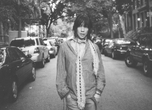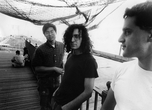Mystery Jets: the interview
Frontman Blaine Harrison talks ‘Radlands’, Radio 1 and Japanese bikini models

Posted: Thu Jun 14 2012
Other bands may have sold more records – okay, a lot more records – but Mystery Jets hold a special place in the affections of many twenty-something UK indie fans. Back when they first started to get attention, the group seemed like successors to the English Eccentric tradition of Syd Barrett – and that was before you took into account that they hailed from London's Eel Pie Island, or that lead vocalist Blaine Harrison's father Henry was also a member of the band. But after the psychedelic quirk of 2006 debut Making Dens, the Jets headed in a poppier direction on their subsequent albums, Twenty One and Serotonin, spawning a clutch of indie disco hits in the process.
Still, if their dancefloor-slaying collaboration with The Count & Sinden, 'After Dark', suggested a move into Hot Chip territory, the group ended up going somewhere completely different on album number four. Radlands was conceived during an extended stay in Austin, Texas, and mines a vein of Southern rock that intermittently recalls Neil Young, Lynyrd Skynyrd and mid-'70s Fleetwood Mac – albeit with about as much authenticity as David Bowie's Young Americans.
Time Out caught up with Blaine shortly after the group played their biggest-ever show at London's Brixton Academy, and talked about the album and the group's upcoming appearance at the Hostess Club Weekender in Tokyo. Mind you, we were really more interested in the bizarre internet rumours linking guitarist William Rees with bikini model Waka Inoue...
It sounds like your gig at Brixton Academy last month went pretty well, then?
It did, yeah. It was a really special gig for us: we haven't played a big London show in a while. It was just like a celebration, really – I think it was a celebration of four records' worth of material. We could've played for hours… but we didn't, thankfully.
Have you found that the songs from Radlands have taken on a different shape since you started touring them?
They have, yeah. Obviously there's certain things you can do in the studio that are hard to recreate on the stage, in terms of mixing and stuff. But at the same time, it's a very organic record: there's not really any trickery on the record, so in a sense it lends itself just to playing the songs as they are.
Radlands is obviously a very different beast from your last two albums. Was there a sense in the band that you needed to make a dramatic break, after doing Serotonin?
I think there was, yeah. Serotonin and Twenty One – I don't think they were pop records, but I think the pillar stones on those records were pop songs, they were singles. And I think with this [album], we didn't want it to be about singles. In England, the indie single market's dead: you don't make 7-inches any more, you don't even make CDs any more, it's all just soft releases. So I think we felt like it's all about the record, from start to finish. That was quite liberating. I love writing pop songs, but we've done quite a lot of that over the last two records, and this was a welcome break from that.
Don't you think that a song needs to be every bit as immediate as the average pop single, just to get exposure on music blogs and the like?
I know what you mean, but I think that the songs that you find trending on those sorts of blogs aren't necessarily the kind of things that you'd find on mainstream radio. If you listen to Radio 1, for example (which I don't, and no one I know does: it's dreadful), there's no guitar music on. Okay, Zane Lowe or someone like that will play the Foo Fighters and one Maccabees track – or The Vaccines, or whoever's doing particularly well at the time – but the mid-level bands aren't on there.
When you're an English band going off to the States and recording an album that's steeped in the American musical tradition, what do you think you're bringing to the table?
It's a good question, because obviously folk and country is a huge, huge tradition. I think we realised very quickly that it wasn't about us trying to make a country record – it was about putting ourselves into a completely new context, just waiting to see what happened. I don't think we went to Texas because we wanted to make a Texas-sounding record: I think it was just the furthest place from London we could possibly think of.
So you didn't have any particular concept for the album?
We've had times in the past when we've made plans as to what we want to do on records, and they always go out the window as soon as we get in the studio. The whole record was just an experiment – well, it wasn't really an experiment, but the process was completely organic. We didn't have a plan, we didn't map out the record, anything like that.
You DJed at Trump Room the last time you were here, and collaborated with The Count and Sinden on 'After Dark' in 2010. Have you never felt tempted to steer Mystery Jets in more of a dance direction?
We worked with Erol Alkan on our second record, and I think we chose to work with him because we did want to make a dance record. When we got in the studio, we just said, 'Right, Erol, we want you to cut everything up, put it through sequencers and put 808 kick drums under everything.' And he was like, 'Yeah, I kind of want to make something that sounds like the records I was into when I was a teenager: stuff like Suede, Pulp…' We weren't really on the same page, but it totally worked – it was a tremendous amount of fun working with him.
You were really young when you started out with the band. Do you think that having your father Henry as a regular member at that point helped you avoid some of the pitfalls that a lot of young bands might fall into?
Absolutely, yeah. A lot of it I didn't even realise: as you said, we were so young – we were 18 when we were signed, maybe 19. Henry was there, and he'd come to all the meetings and he'd say, 'Right, you can take this and go and have a little holiday with your girlfriend or do whatever you want to do, and the rest of this money is going into a bank account. I know you want to take it all now, but you're going to thank me for this later.' And thanks to that, we're still afloat.
Is there any truth in the claim on your Wikipedia page that William was romantically involved with Japanese bikini model Waka Inoue?
Is she a real person? I remember that being put up, and then it got taken down. Obviously someone's put it up again. That's Wikipedia for you. We must meet her! Maybe we should invite her to our show when we come over.
She's not as big a celebrity as she used to be, so she's probably got time on her hands. Do you have anything else planned while you're here?
It's a difficult one for us, because we're going to be on tour in America, and we had four days between shows, so we're flying to Tokyo, playing the festival and then going back. It'll be rapid fire, you know?
It's like you'll be okay as long as you don't sleep while you're here…
Yep. But Japan's kind of always like that. Whenever I think back to the times we've been there, it's always been sleep madness: turning up at Fuji Rock or whatever it is, and everyone there is as jet-lagged as each other, and you all just sort of drink to get through it. Good fun.
Mystery Jets play at the Hostess Club Weekender, June 23 at Yebisu Garden Hall
Tweets
- About Us |
- Work for Time Out |
- Send us info |
- Advertising |
- Mobile edition |
- Terms & Conditions |
- Privacy policy |
- Contact Us
Copyright © 2014 Time Out Tokyo














Add your comment